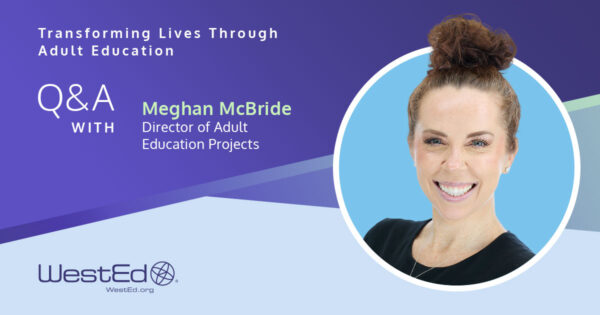
November 20, 2023
This post was originally published by WestEd’s Center for Economic Mobility.
By Ann Edwards
U.S. adult numeracy education is a complex landscape. Numeracy, defined by the National Center for Education Statistics as “the ability to access, use, interpret and communicate mathematical information and ideas in order to engage in and manage the mathematical demands of a range of situations in adult life,” emphasizes learners’ use and application of mathematical skills, understanding, and, increasingly, digital literacy. In trying to build these skills, adult learners must navigate a variety of course structures around the competing demands of their daily lives, while instructors balance diverse policies, content, and standards to try to meet learners’ needs. So how can adult numeracy instructors create courses that address this reality and help students succeed?
The Adult Numeracy in the Digital Era (ANDE) Project was funded by the U.S Department of Education Institute for Education Sciences to develop and test a technology-enabled approach to improving adult numeracy and digital literacy. As part of this project, we scanned the field to gain a better understanding of the adult numeracy education landscape and inform our course design. Using a data collection and synthesis approach pioneered by researchers at the Carnegie Foundation for the Advancement of Teaching and the Institute for Healthcare Improvement, we examined written resources, interviewed experts, and conducted site visits. Two themes emerged from our research:
Variability is a defining element of adult education.
- Adult learners bring a variety of backgrounds and levels of readiness as well as valuable and unrecognized practical numeracy knowledge drawn from life experiences—such as running businesses and obtaining prior degrees.
- Numeracy instructors also have varied backgrounds in education and mathematics, and teach in complex situations where they must respond to multiple, competing standards, work in a range of classroom contexts, and address state and federal requirements that compete with learning activities.
- Course schedules and structures vary across several dimensions—course length, frequency of class meetings, delivery method, class duration, format—and these differences make planning and course development challenging for instructors and institutions.
Learner goals are diverse and there are obstacles to meeting them.
- Adult learners are motivated to participate in adult education by personal, societal, and economic forces to attain high school credits or a diploma, college readiness, new job skills, or general career advancement.
- Although they are goal-oriented and committed to their courses and future endeavors, adult learners have limited time and competing responsibilities, including work and family commitments.
- Course content, standards, and sequences may not directly align with adult learners’ goals, in part because policies and federal reporting requirements may shift the focus to other priorities.
Given these factors, we have identified three principles for adult numeracy course design to make courses more responsive to learners, along with questions that instructors and course designers can consider.
Principle #1: Aligned and Relevant
Adult learners want course content that meets their needs and will help them attain their personal and professional goals. However, with learners’ diverse experiences and the paucity of rigorously-tested adult learning curriculum materials, instructors spend significant time deciding on content while balancing the demands of mandated standards and high-stakes assessments. Formative assessment data, such as collecting student responses systematically and identifying common student errors, would help instructors better address student needs and facilitate students’ development and conceptual understanding.
Keep these ideas in mind by asking yourself the following questions:
- What are my students’ goals and how do I know?
- What connections can I make from the course content to my students’ goals?
- How does the course content support overlooked aspects of numeracy like mathematical practices or problem-solving skills?
- What information could I easily gather to use for formative assessment?
Principle #2: Interactive and Participatory
In variable policy contexts and learning conditions, flexible and engaging mathematics activities create rich mathematics learning opportunities for students. Students mentioned how important it was to be able to ask questions freely and receive just-in-time support from instructors. Different learning modalities—online or in-person classes, videos, worksheets—were also described as compelling and motivating.
Identify approaches you could take by addressing the following questions:
- What activities encourage student mathematical talk?
- How do I use synchronous and asynchronous instruction strategically to realize learning goals?
Principle #3: Relationship-Centered
Students’ academic mindset, self-efficacy, and anxiety influence how they feel about and perform in a mathematics learning situation and the trust that they develop with others in that setting. Adult numeracy instructors are exceedingly mission-driven and seek to build trusting relationships with their students and support their students’ success, even if they may focus more on supporting ongoing attendance than on emphasizing numeracy skills.
Build on these strengths by considering the following questions:
- What do I know about my students as mathematics learners?
- What strengths do my students bring to mathematics class and how can I capitalize on them?
- What activities can I include to foster a mathematics community?
Gain a more comprehensive picture of the adult numeracy education landscape and key factors impacting adult numeracy learning and technology use by reading the full research brief or revisiting our Adult Numeracy in the Digital Era (ANDE) project website for updates on the development of our adult numeracy course.


